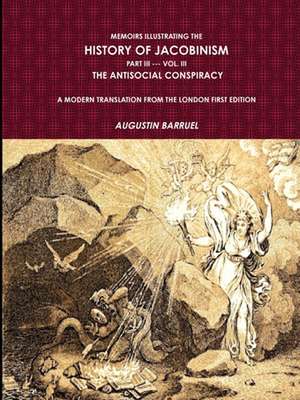Memoirs Illustrating the History of Jacobinism. Part III --- Vol. III, the Antisocial Conspiracy. a Modern Translation from the London First Edition.
Autor Augustin Barruelen Limba Engleză Paperback
Preț: 276.12 lei
Nou
Puncte Express: 414
Preț estimativ în valută:
52.84€ • 55.06$ • 43.75£
52.84€ • 55.06$ • 43.75£
Carte tipărită la comandă
Livrare economică 04-18 aprilie
Preluare comenzi: 021 569.72.76
Specificații
ISBN-13: 9781365954269
ISBN-10: 1365954269
Pagini: 474
Dimensiuni: 210 x 280 x 24 mm
Greutate: 1.09 kg
ISBN-10: 1365954269
Pagini: 474
Dimensiuni: 210 x 280 x 24 mm
Greutate: 1.09 kg
Notă biografică
Augustin Barruel (1741 - 1820) was a prolific author and Jesuit priest born in France. He dedicated himself to literature after the suppression of the Society of Jesus and was exiled during the Revolution. While in London, he wrote Histoire du clergé, pendant la Révolution française (1793), which went through several editions and multiple translations, and strengthened British opposition to revolutionary principles. His best-known work, Mémoires pour servir à l'histoire du Jacobinisme (1797), established, along with John Robison's own book on the same subject, and Charles-Louis Garat de Gassicourt's on the Templars, the basis for the modern conspiracy theory of history. After the fall of the Directory, Barruel returned to France, where he defended the Napoleonic order. He ended his days engaged in a vigorous, Europe-wide controversy relating to his work, The Papal Power.
